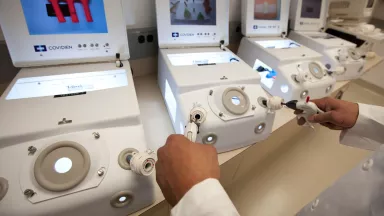Introduction
Our world-renowned orthopedic surgeons and orthopedists are experts in their fields with specialized training to provide the optimal diagnosis and treatment for a range of orthopedic conditions. We are internationally recognized for delivering the highest-quality orthopedic care to our patients.
What is osteonecrosis (avascular necrosis)?
Osteonecrosis, also known as avascular necrosis, is bone death that occurs when the blood supply to the bones is decreased or stopped. Without an adequate blood supply, the bone breaks down, dies and collapses. If the bone affected is near a joint, the joint may also collapse. Although any bone can be affected, osteonecrosis most often affects the ends of the long bones, such as the upper leg bone at the hip. Osteonecrosis is also called aseptic necrosis or ischemic necrosis.
What causes it?
An injury, such as one caused by forceful impact in an auto accident or by complication from a hip fracture or dislocation, can lead to osteonecrosis. Diseases such as sickle cell disease, gout and lupus increase the risk of osteonecrosis, as can long-term use of corticosteroids or drinking a large amount of alcohol over a long time.
What are the symptoms?
Osteonecrosis most often occurs in men between 40 and 50 years old. Symptoms may include mild to moderate hip or groin pain, decreased hip movement or a limp. Pain may be sudden and become worse when you stand or walk. Rest usually relieves the pain.
Children with osteonecrosis may have spasms in the hip muscle, have a limp or refuse to bear weight. Legg-Calve-Perthes disease is a type of osteonecrosis in children that causes hip problems.
How is it treated?
Doctors usually start with treatments to limit further damage to the bone and joint and help the bone grow. Treatments may include medicines, exercises and electrical stimulation as well as limiting weight-bearing on the joint. Nonsteroidal anti-inflammatory drugs (NSAIDs) may be prescribed to reduce pain. Eventually, most people with osteonecrosis need surgery.
Physician Referrals
Montefiore Einstein embraces a collaborative approach.
If you have a patient who could benefit from our services, please reach out.
718-920-2060
Schedule a Visit
Have a general question or concern?
We’re available to help you by phone or email.
• 718-920-2060 • orthofeedback@montefiore.org






